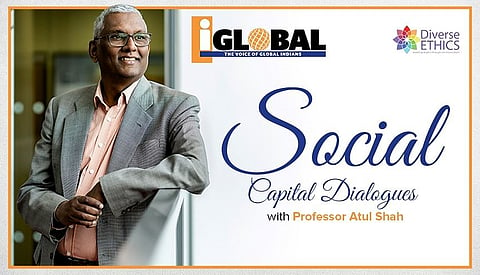

India today is world famous as a software and IT hub of the planet. However, few know that there is a particular history and strategy which led India to become this global powerhouse. In the 1950s the visionary scientist Vikram Sarabhai and Jawaharlal Nehru came together to invest in the scientific and educational research base to make India truly independent intellectually. They created pioneering new institutions.
You may have all heard of the Indian Institute of Technology whose skilled graduates have long been one of India’s major global exports and are now top scientists, engineers and entrepreneurs all over the world. These pair of visionaries also created the Indian Space Research Organisation (ISRO) one of whose early working class employees, Dr Abdul Kalam, later rose to become a visionary President of India.
History, Institutions and Politics have a huge influence on a whole country and it’s economic and social upliftment. Sadly so little history is taught today and students have little sense of the past influences on their futures. They ought to be curious about history and understand that not all that is modern is best or worthy. Also a technical education can be limiting in terms of understanding society and politics.
MORE LIKE THIS…
British universities were also created with such big and hopeful intellectual visions. However today they have become businesses and homes for competitive individualist egos and careers. They ought to be places where there is a deep and conscious collaboration in ethical research for lifting society out of the mess of its own creation – the Anthropocene. They are looking inward rather than outward. In terms of values and ethics, there is little ‘cultural’ diversity of thought besides platonic secular western worldviews and liberalism or Marxism.
The vast ocean of wisdom that is Dharma is at best confined to religion departments and even there it is rarely studied and celebrated as a positive intellectual vision for an equal, inclusive, sustainable and non-violent world. Our holistic approach to health, community and learning was so ahead of its time and still so underrated or unknown to the wider world especially in its systems of knowledge and education. I know because I go to international conferences and regularly speak and listen to other academics. Furthermore, the West is wedded to power over people, animals and nature and obsessed by the need to create constant fear and anxiety through domination and control. Even environment can be used as a weapon of promoting fear rather than sustainability.
In particular the social sciences have withered into arguments over truth and postmodernism rather than consciously solving inequality and environmental catastrophe. They are obsessed by secularism, utilitarianism and materialism. The fields of business and finance have become particularly decadent and damaging by legitimating the giant corporations and financial markets as the best models of economic management. Their critique of business is often narrow and parochial and celebrates greed and exploitation.
Academic roles have become careers rather than vehicles for passionate social transformation. Much needs to be done. At the 100-year-old British Academy, an elite fellowship club and funding body for social scientists, the new CEO Hetan V. Shah is creatively raising such deeper questions about the purpose of the social sciences in bringing new directions to knowledge and education with impact and conscience. Like Vikram Sarabhai, he too is a Jain and in the history of the Jains, there is a long heritage of working with power to bring transformational change.
MORE LIKE THIS…
Our Dharma and culture is India’s greatest soft power in the world. It is making a difference as we travel and lead a variety of fields and institutions. As individuals we should strive to learn more about it and share it with others. It is our capital asset. Let’s not misunderstand, undervalue or devalue it.
Intellectuals play a very critical role in society – they have power to improve it or worsen it, depending on their conduct, writings and behaviour. It’s important to understand their role in shaping knowledge and the power of institutions to magnify it in both good and bad ways. It also happens that institutions once created lose their purpose and can become a power unto themselves. This should be checked and questioned. A lot of the work of research is invisible to the naked eye. So is its influence.
Professor Atul K. Shah [@atulkshah] teaches and writes about Indian wisdom on business, culture and community at various UK universities and is a renowned international author, speaker and broadcaster.
*Info: Dr Vikram Sarabhai